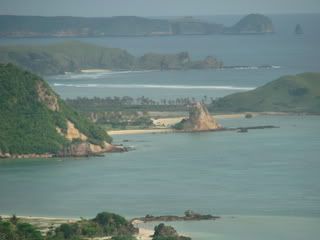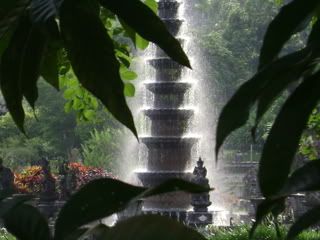We took a hired car to Sengiggi, Lombok's main tourist beach, and checked into a hotel which once must have been quite the place but in the past few years has evidently been left to rot. It a way that's a good metaphor for Lombok as a whole, where there is a lot of beauty and a lot of rot.
(Kuta, Lombok)

Next we went to Kuta Lombok, where the town is a cluster of trash piles and mangy stray dogs but the beaches are wide and white and packed by forests of palm trees and sandstone cliffs.
The past few days we've been in Mataram, Lombok's capital city, a sprawling mess of open storm drains and endless motorbike jams but plenty of spots of beauty, too -- a line of girls walking to school, a sudden burst of orange from cosmos planted near a home, small Hindu offerings in front of small temples.
Like Bali, Lombok has a strong Hindu presence, though it's not nearly as well developed or preserved as Bali's Hindu culture is. But like the rest of Indonesia, Hindus, Muslims and Christians here work to get along. A guide at the water palace today told us how holidays from each of the religions are celebrated by everyone. When the Christian church has something going on, he said, the nearby mosque pipes down. When the Muslims are having a fete, the Hindus keep quiet, and so forth. It seems like a philosophy worth following.
Like much of the rest of Indonesia, Lombok is caught between modernity and a sort of ancient-ity. Kids here, I reckon, can out-text most American kids; on the other hand, local clerics have just issued a fatwa prohibiting Muslims from practicing yoga and voting for non-Muslims in upcoming elections.
We have been picking up the English-language Jakarkta Post (a fantastic newspaper -- better than anything we saw in Australia and better than most American papers, too) and every day it's full of Indonesia's history, writ large as current events: Christians worry Muslims will implement shari'a law; Muslim women are choosing divorce over polygamy; the government is receiving requests to log over the last remaining stands of Borneo rainforest in order to expand palm oil plantations.
We've continued to dig Indonesian food, and have replaced Bali coffee with Lombok coffee; both are made cowboy-style, with fine grounds dumped into hot water and stirred. Though we like the food, I feel like I'm slowly withering away: it's all pretty small portions, and I've still got a pretty large appetite.
(water palace)

We've also continued to be stymied by island transport. Most people take bemos to get between towns -- a bemo is a pickup or van hollowed out and filled with seats. You are charged 25 cents to go from one city to the other. Or should be -- we routinely get charged 10 times that; often an empty bemo will stop and pick us up, turning a normal ride into a "special ride" with "special fares." The only real alternative is to simply hire people to take you in their cars where you want to go. I hate having what amounts to a taxi take us around the island but there seem to be few other options.
So the little things that bug us -- gas fumes, endless rain (it's the monsoon season), and expensive bemos -- can be negated by finding a spot of paradise. It's the off season for tourists (after bombings, a dictator, minor wars and a worldwide economic recession, it looks like Indonesia may be in permanent offseason for the forseable future) and we've gotten some sweet deals on hotels. One of those was in Kuta, where we got a huge modern motel room in a tiny resort with expansive grounds and a big pool just back from the beach. The real surprise came when we opened the door to the bathroom -- 150 square feet of outdoor shower and toilet. Needless to say, it took some getting used to.
One night we had dinner at a warung -- a simple sort of cafe -- overlooking Kuta's halfmoon bay. Huge waves were breaking about a mile offshore on a coral reef, but as the sun set the tide withdrew and fishermen with innertubes and lanterns and nets waded into the water; by full dark the bay was aglow with more than a hundred shimmering lights.
We rented a motorbike -- that's what I'm calling these tiny motorcycles everyone drives here -- from the guy who cleaned our room one day and toured the coast. It was refreshing to move under our own power for once, and fun to see the countryside. Naked kids would run into the road to hold out their hands so we could slap then as we went by. We'd follow narrow sandy tracks that would pop out at blazing white sand beaches and stopped at a mountaintop restaurant for coffee and a sandwich.
When we got back to the hotel I went to find Agust, the bike's owner, and he asked me, "How was it, Obama?"
Calling Americans here "Obama" is sort of a joke, but a good one. It's the first thing everyone says when you tell them you are American (tentatively, we've renounced our "Canadian" citizenship in favor of the truth). Obama lived in Jakarta for a short while when he was a kid, and apparently still knows some Bahasi Indonesian. News that he may visit Jakarta in July has the locals going nuts. It's possible to think that with this sort of enthusiasm America's impasse with the Muslim world may be coming to and end.
We take an early morning flight tomorrow for Sulawesi, a twisted orchid of an island north of here once known as Celebes. "Celebes" was once one of my favorite coffees for sale by the pound at Salt Lake Roasting Company. I've got high hopes for Sulawesi.
1 comment:
See, all roads lead to Salt Lake City sooner or later. Nice post.
Post a Comment